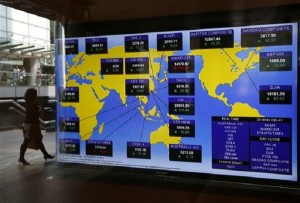Global stocks jittery after US government shutdown

A woman walks past a screen showing the world stock index at Hong Kong Stock Exchange in Hong Kong, Wednesday, Oct. 2, 2013. The Asian Development Bank cut its economic growth forecast for developing Asia on Wednesday, citing weakness in region’s two largest economies China and India and jitters over plans to scale back U.S. stimulus that destabilized financial markets. AP
BANGKOK — Global stocks remained jittery Wednesday on fears that a partial shutdown of the U.S. government could undermine the country’s fragile economic recovery.
The shutdown, which furloughs some 800,000 federal employees, went into effect after a politically divided Congress failed to approve short-term funding to keep the government functioning past Monday, the end of its fiscal year.
Analysts said they expect the budget stalemate to be resolved before the shutdown inflicts damage on the economy, which has been struggling with a weak housing market and high unemployment in the aftermath of the 2008 financial crisis.
But there were signs at least some investors were keeping their guard up.
Britain’s FTSE 100 fell 0.9 percent to 6,401.48. Germany’s DAX was 0.6 percent lower at 8,634.37. France’s CAC-40 lost 0.9 percent to 4,159.57.
Article continues after this advertisementWall Street looked headed for losses, too, with Dow Jones industrial futures sinking 0.6 percent to 15,028. S&P 500 futures fell 0.8 percent 1,676.30.
Article continues after this advertisementIn Asia, Hong Kong’s Hang Seng rose 0.6 percent to 22,984.48, reopening after a one-day public holiday, but trading volume was very light. Australia’s S&P/ASX 200 was nearly 0.2 percent higher at 5,215.60. South Korea’s Kospi rose marginally to 1,999.47. Benchmarks in Indonesia, Taiwan and the Philippines also rose.
Some investors fear the budget standoff could spill over into a dispute about raising the nation’s borrowing limit. Treasury Secretary Jack Lew said last week that the government would run out of borrowing authority by roughly Oct. 17.
The last time the borrowing limit, or debt ceiling, issue came up in August 2011, it led to a downgrade of the United States’ credit rating by Standard & Poor’s.
“Everyone is very cautious about how to react to the U.S. shutdown,” said Andrew Sullivan at Kim Eng Securities in Hong Kong. “There’s a lot for people to worry about. In such cases, people prefer to hold their cash on the sidelines.”
Japan’s Nikkei 225 index plummeted 2.2 percent to close at 14,170.49 after the government Tuesday announced it would go ahead with a sales tax increase in April. The tax, intended to offset the country’s soaring public debt, will rise from 5 percent to 8 percent.
Markets in mainland China were closed for public holidays, so couldn’t react to a survey showing that manufacturing in the world’s No. 2 economy barely expanded in September. Tuesday’s report by the China Federation of Logistics and Purchasing showed manufacturing expanded for the third month in a row.
But the group’s purchasing managers’ index rose by only a fraction to 51.1 last month from 51.0 in August, less than economists expected.
Benchmark oil for November delivery was down 52 cents to $101.52 per barrel in electronic trading on the New York Mercantile Exchange. The contract fell 29 cents to close at $102.04 on Tuesday.
In currencies, the euro fell to $1.3529 from $1.3518 late Tuesday. The dollar fell to 97.42 yen from 98.02 yen.